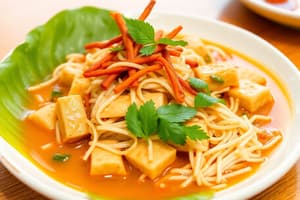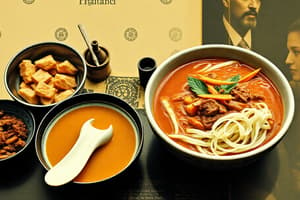Podcast
Questions and Answers
What is the purpose of chilies in Thai cuisine according to Thai beliefs?
What is the purpose of chilies in Thai cuisine according to Thai beliefs?
- to cool the body, stimulate appetite, and bring balance and harmony to food (correct)
- to add flavor to dishes
- to add color to dishes
- to add texture to dishes
Which neighboring country introduced rice porridge, fried rice, and noodles to Thailand?
Which neighboring country introduced rice porridge, fried rice, and noodles to Thailand?
- India
- Vietnam
- Cambodia
- China (correct)
What is the name of the curry dish that originated from India and Persia?
What is the name of the curry dish that originated from India and Persia?
- Kaeng Matsaman (correct)
- Kaeng Kahi
- Massaman Curry
- Yellow Curry
What is the name of the region that shares similar food influences from Laos and the Chinese province of Yunnan?
What is the name of the region that shares similar food influences from Laos and the Chinese province of Yunnan?
What is a characteristic of Southern Thai curry?
What is a characteristic of Southern Thai curry?
What is the name of the refined cooking technique that originated from the central Thai plains?
What is the name of the refined cooking technique that originated from the central Thai plains?
What is the name of the dish that was influenced by Western cuisine from the 17th century onwards?
What is the name of the dish that was influenced by Western cuisine from the 17th century onwards?
What is a characteristic of Northeastern Thai dishes?
What is a characteristic of Northeastern Thai dishes?
What is the name of the type of rice that is dry-fried until brown and then ground into a powder?
What is the name of the type of rice that is dry-fried until brown and then ground into a powder?
What is the main ingredient in Soy Sauce?
What is the main ingredient in Soy Sauce?
What is the Thai name for shrimp paste?
What is the Thai name for shrimp paste?
What is the name of the fish sauce that is a staple ingredient in Thai cuisine?
What is the name of the fish sauce that is a staple ingredient in Thai cuisine?
What is the name of the Thai chili paste similar to Indonesian and Malaysian sambals?
What is the name of the Thai chili paste similar to Indonesian and Malaysian sambals?
What is the unique characteristic of Sticky rice (Khao niao)?
What is the unique characteristic of Sticky rice (Khao niao)?
What is the Thai phrase for 'thank you'?
What is the Thai phrase for 'thank you'?
What is the purpose of Vinegar in Thai cuisine?
What is the purpose of Vinegar in Thai cuisine?
What is the purpose of the bamboo sticky rice serving baskets?
What is the purpose of the bamboo sticky rice serving baskets?
What is the flavor of aubergines?
What is the flavor of aubergines?
What are bamboo shoots?
What are bamboo shoots?
What is bean sauce made from?
What is bean sauce made from?
How many varieties of basil are mentioned in the text?
How many varieties of basil are mentioned in the text?
What is the most commonly used flavoring in Thai food?
What is the most commonly used flavoring in Thai food?
What is a good substitute for galangal?
What is a good substitute for galangal?
What is palm sugar made from?
What is palm sugar made from?
What is the primary source of spiciness in Thai cuisine?
What is the primary source of spiciness in Thai cuisine?
What is the staple food in Thai cuisine?
What is the staple food in Thai cuisine?
What is the purpose of a sticky rice steamer set?
What is the purpose of a sticky rice steamer set?
What is the name of the mortar and pestle set used in traditional Thai kitchens?
What is the name of the mortar and pestle set used in traditional Thai kitchens?
In which regions of Thailand are sticky rice serving baskets commonly used?
In which regions of Thailand are sticky rice serving baskets commonly used?
What is the name of the spicy papaya salad that is commonly made with a mortar and pestle?
What is the name of the spicy papaya salad that is commonly made with a mortar and pestle?
What is the main ingredient in prik nam pla?
What is the main ingredient in prik nam pla?
What is the name of the bamboo basket used to serve individual portions of sticky rice?
What is the name of the bamboo basket used to serve individual portions of sticky rice?
Flashcards are hidden until you start studying
Study Notes
Introduction to Thai Cuisine
- Thai cuisine is known for its spicy and exotic dishes, with "Thai" meaning spicy or hot.
- Thai people believe that chilies cool the body, stimulate the appetite, and bring balance and harmony to their food.
Historical Influences
- Thai cuisine has been influenced by neighboring countries, including China, India, and Persia.
- The Chinese introduced dishes such as rice porridge, fried rice, noodles, and stewed pork with rice.
- The Chinese also introduced the wok, deep frying, and stir-frying techniques, as well as noodles, oyster sauce, and soybean products.
- Indian and Persian influences can be seen in dishes like kaeng kahi (yellow curry) and kaeng matsaman (massaman curry).
Regional Cuisines
- Thailand has four regional cuisines: Northern, Northeastern (or Isan), Central, and Southern.
- Each region has its own unique cuisine, influenced by neighboring countries and regions.
- Examples of regional influences include:
- Burmese cuisine in the Northwest
- Chinese province of Yunnan and Laos in the North
- Vietnamese and Cambodian cuisine in the East
- Malaysian cuisine in the South
- Thai Royal Cuisine has refined cooking techniques and uses of ingredients influenced by the central Thai plains.
- Western influences from the 17th century onwards have led to dishes like foi thong and sangkalaya.
Characteristics of Thai Cuisine
- Thai cuisine is considered the spiciest in Southeast Asia, with spiciness coming from pastes used in curry preparation.
- A variety of sauces and condiments are used, including prik nam pla/nam pla phrik, dried chili flakes, sweet chili sauce, and sriracha sauce.
- Nam pla (fish sauce) is a strong-smelling and strong-tasting ingredient found in almost all Thai dishes.
- Jasmine rice is the staple food, a sweet-smelling grain native to Thailand.
- Herbs, spices, and leaves like kaffir-lime are used in many Thai dishes.
Thai Cooking Tools and Utensils
- Sticky rice steamer set: essential for preparing sticky rice at home.
- Kruk Thai mortar and pestle: a must-have tool for making Som Tom (spicy papaya salad).
- Sticky rice serving baskets: used to serve steamed sticky rice in homes and restaurants.
Thai Basic Ingredients
- Aubergines: a mildly sweet vegetable.
- Bamboo shoots: edible young shoots of the bamboo plant.
- Bean curd: often used in soups and Chinese dishes.
- Beansprouts: sprouted from mung beans, used in salads and stir-fried dishes.
- Bean sauce: made from salted fermented soy beans, used in oriental dishes.
- Basil: a pungent herb with three varieties: bai mangluk (hairy basil), bai horapa (sweet basil), and bai grapao (Thai or holy basil).
- Chili: small red and green fresh chilies are extremely hot, while larger varieties are slightly milder.
- Coconut milk: made from grated coconut flesh and water, essential in many Thai dishes.
- Coriander: both leaves and seeds are important ingredients in Thai cooking.
- Curry paste: used in the preparation of curry dishes.
- Fish sauce (nam pla): a commonly used flavoring in Thai food.
- Galangal: similar to fresh ginger root, with a more translucent skin and pinkish tinge.
- Garlic: indispensable in Thai cooking.
- Ginger: a good substitute for galangal.
- Kaffir lime: zest of the fruit and dark glossy green leaves are used in soups and curries.
- Lemon grass: known as citronella, has long pale green stalks and a bulbous end similar to a spring onion.
- Palm sugar: strongly flavored, hard brown sugar made from the sap of the coconut palm tree.
- Roasted ground rice: raw glutinous rice grains that are dry-fried until brown, then ground to a powder.
- Salty eggs: khai kham.
- Shallots: used more extensively than onions in Thai cuisine.
- Soy sauce: made from fermented soy beans, available in light or dark versions.
- Tamarind: an acidic tropical fruit that resembles a bean pod.
- Vinegar: a mild, plain white vinegar used in Thai cooking.
Pastes and Sauces
- Nam pla: a very aromatic and strong-tasting fish sauce.
- Pla ra: a more pungent sauce made from fermented fish, often used in Thai cooking.
- Kapi: a Thai shrimp paste made from fermented ground shrimp and salt.
- Nam phrik: Thai chili pastes similar to Indonesian and Malaysian sambals, with different regional versions.
Rice and Noodles
- Rice is a staple grain in Thai cuisine, as in most Asian cuisine.
- Jasmine rice is highly prized and native to Thailand.
- Sticky rice (Khao niao) is a unique variety of rice that cooks up to a sticky texture.
Studying That Suits You
Use AI to generate personalized quizzes and flashcards to suit your learning preferences.




